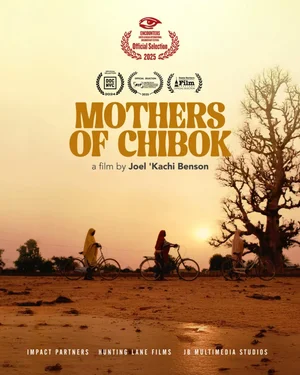Encounters 2025: Mothers of Chibok Review – A Chronicle of Hope, Loss, and Unbreakable Faith
In the aftermath of tragedy, keeping up with the torrent of information can be overwhelming. Distinguishing fact from fiction, sentiment from propaganda, often becomes a Herculean task. And when reality becomes too complex, too painful, we fall back on the coping mechanisms passed down to us—silence, numbness, distraction.
This is where stories step in. This is where films try—however imperfectly—to give shape to the chaos. Cinema, particularly documentary film, can serve as a powerful tool for remembrance, offering structure to painful histories and illuminating the forgotten corners of our collective memory. Rooted in lived experiences and factual accounts, documentaries can anchor us in truth when the world feels unsteady.
In a society like Nigeria, where the average citizen is focused on basic survival—food, shelter, clothing—tragedies tend to fade fast. Not because they are any less tragic, but because to linger too long in grief becomes unbearable. So we scroll past headlines, make jokes to cope, and pray for the news cycle to move on.
But some wounds refuse to heal with time. In 2014, 276 schoolgirls were abducted by Boko Haram in Chibok, Borno State. The nation cried out. Some mocked, others marched. And then, gradually, the moment slipped into the background. Life resumed—for everyone except those directly affected. For the girls who were taken, and the families they left behind, time stood still.
Many documentaries have explored the Chibok abduction and its aftermath. One such film is Captive (2021), a documentary by Canadian journalist Melissa Fung, which connects the trauma of Nigerian girls with the filmmaker’s own experience of being kidnapped in Afghanistan.
But Mothers of Chibok, directed by Joel Kachi Benson, takes a different approach. A follow-up to his award-winning VR short Daughters of Chibok, this new documentary turns its lens toward the mothers—those who waited in agony for news, who watched terrorist videos of their daughters paraded as trophies, who prayed through pain the world had long forgotten.
The Power of Ordinary Resilience
The film opens with the quiet rhythm of life—roosters crowing, children preparing for school. It’s a striking contrast: in a place threatened by extremist ideologies, education remains a priority. The people of Chibok, despite being at the edge of violence, persist in sending their children to school. This single image collapses the perceived distance between Nigeria’s North and South—reminding us that Chibok isn’t just a name in the news. It is home to real people, real dreams.
We meet Lydia, whose children risk being sent home for unpaid school fees. She pleads with administrators for a chance to keep them enrolled. Ladi, a farmer and teacher, does the same. Yana, another mother and community leader, negotiates with a landowner for space to plant crops. Their goals are the same: raise enough money to educate their children.
As planting season begins, the women work the fields, warning their kids to stay alert for danger. They plant maize, peanuts, and cowpeas—not just for food, but as a means to secure an education. At night, Lydia remembers her sister Ruth, abducted in 2014. Despite the passing years, hope lingers. Yana and Ladi, who lost their daughters Rifkatu and Aisha, carry that same hope.
Their faith remains unshaken. Yana continues to attend church, where prayers focus on a bountiful harvest—again, so children can stay in school. It becomes clear that education is both the community’s resistance and redemption.
The Return of a Daughter
We meet Mariam, one of the girls who made it back. She returns with a son, Ali, born during her captivity. Instead of shame or burden, Mariam sees him as a blessing. Now a student at the American University of Nigeria in Yola, she returns to her village to ask her brother to help raise Ali so he too can begin his schooling. Her determination reinforces the central message of the film: the people of Chibok are not abandoning education—they are embracing it more fiercely than ever.
Visual Language and Emotional Truth
Benson’s cinematography offers both beauty and honesty. Drone shots showcase the natural expanse of the region. Silhouettes against the sunrise give the film a poetic stillness. Quiet moments are allowed to breathe; nothing is forced or overdramatized. When rain finally comes, children play in it joyfully, and farmers smile—the harvest, after all, means one thing: more tuition fees covered.
Then, a call comes in: some abducted girls have been released. Yana prays her daughter is among them. Her family has kept Rifkatu’s belongings untouched. “We show her love by keeping the pieces she left behind,” Yana says.
Her daughter, Laraba, now considers joining the army. She wants to stop feeling powerless, to act. Her mother cautions that some things may be beyond the government’s reach—but Laraba remains hopeful. Perhaps, for her, action is another form of mourning.
The Weight of Waiting
A significant portion of Mothers of Chibok is spent waiting—waiting for the rains, for a harvest, for news. When Lydia hears that Aisha may be alive, she travels to Maiduguri. She waits eight days, torn between her responsibilities back home and the desire for reunion. When they finally embrace, it’s a raw, unforgettable moment. Tears flow. Songs of praise ring out. And yet, for every joyful return, there are more mothers with unanswered questions. The grief in the room becomes communal.
Conclusion: A Testament to Memory and Survival
When Black Panther (2018) opened with T’Challa storming a Boko Haram camp in the Sambisa forest, it felt like a global wish—an imagined resolution for a tragedy no hero came to stop. But in real life, we have no superpowered saviors. We have only memory—and those brave enough to preserve it.
Joel Kachi Benson’s Mothers of Chibok is one such act of preservation. It’s not just a film—it’s a prayer, a record, a mirror. It asks us not to look away. Not to forget.
Every Nigerian should see it.
Screening Info:
Mothers of Chibok was featured at the 2025 Encounters South African International Documentary Festival (June 19–29) and won the Encounters Al Jazeera Award for Best African Feature Documentary.
Support the Work:
💡 Become a patron – Help sustain thoughtful, independent storytelling.
💬 Join the conversation – Share your thoughts in the comments or on social media.
📅 Track new releases – Add upcoming films and shows to your Google Calendar.
Let me know if you’d like this formatted for a blog, newsletter, or press publication.



























💬 No comments yet. Be the first to share your thoughts!